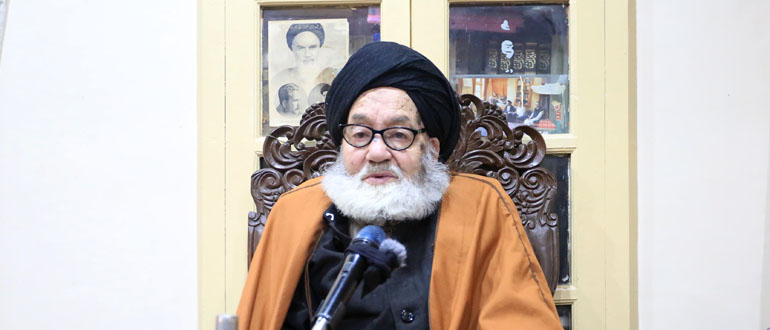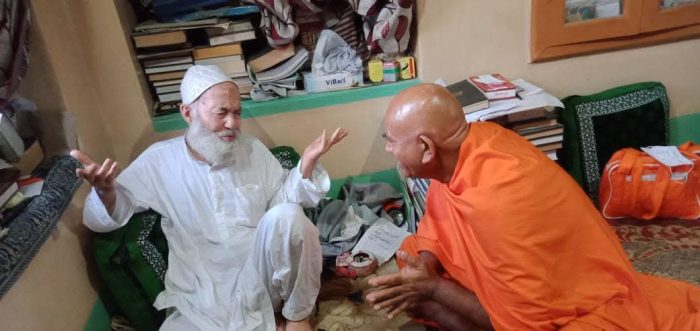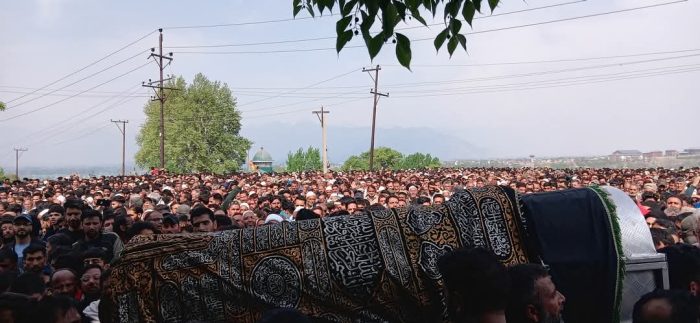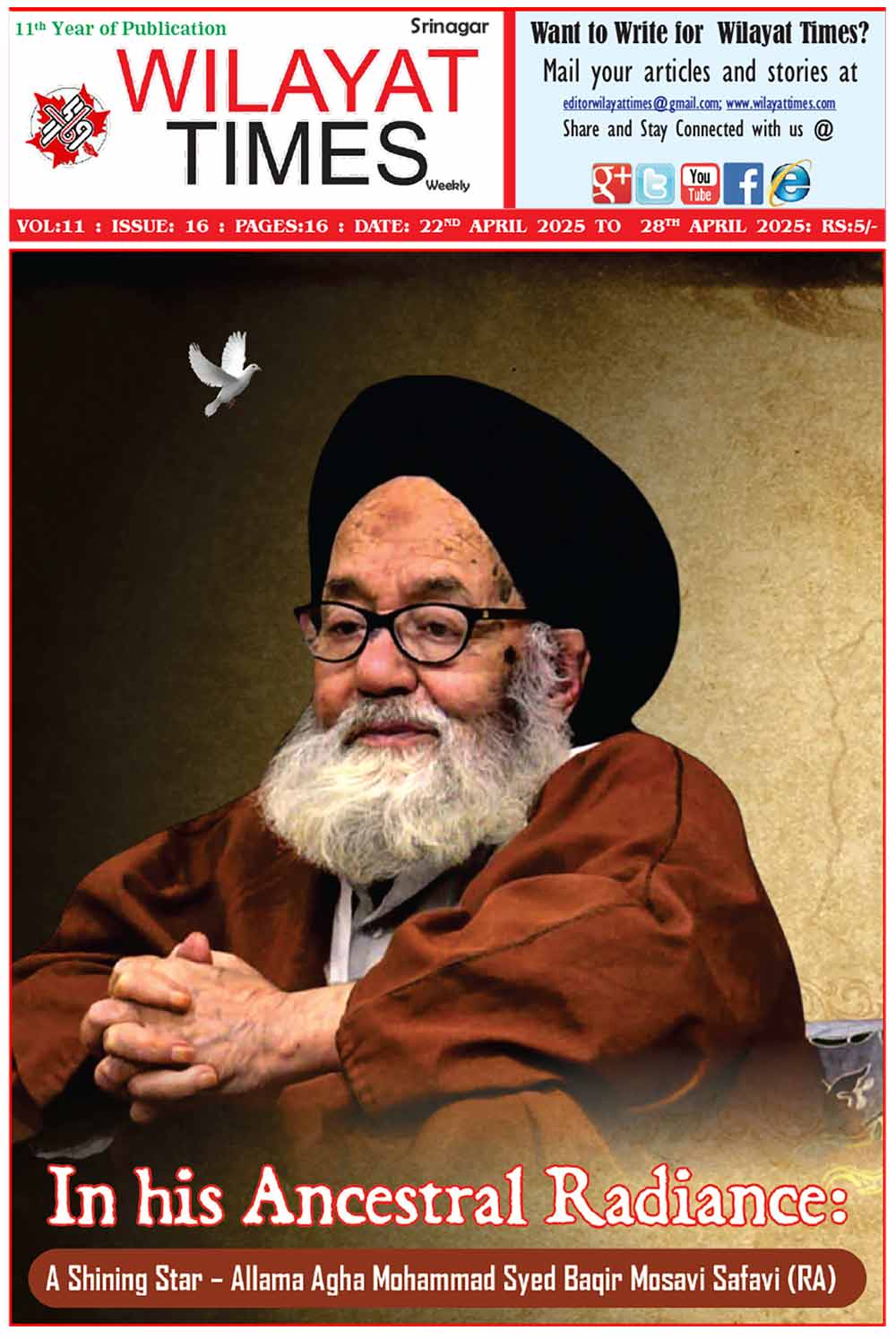Every time I climbed those few familiar steps to Alama’s Dewa’n Khaneh nestled in Budgam, it felt like stepping into a different world. In the quiet corner of his modest room, walls lined with timeworn books and a stillness that seemed sacred. He would sit with quiet dignity. A scholar by calling, a grandfather by presence, and a poet in the quiet moments between, Alama lived in the gentle rhythm of wisdom shared softly, never imposed.
A Tribute to Allama Aga Syed Muhammad Baqir ibn Hujjatul Islam Aga Syed Ahmad Mousavi Najfi Kashmiri
غالبؔ ندیم دوست سے آتی ہے بوئے دوست
مشغولِ حق ہوں بندگی بو تراب میں
Ghalib, the scent of the Beloved comes from the friend’s confidant—
I am absorbed in the Divine, devoted to the servitude of Abu Turab.(Ali).
By Syed Burhan Hyder
Every time I climbed those few familiar steps to Alama’s Dewa’n Khaneh nestled in Budgam, it felt like stepping into a different world. In the quiet corner of his modest room, walls lined with timeworn books and a stillness that seemed sacred. He would sit with quiet dignity. A scholar by calling, a grandfather by presence, and a poet in the quiet moments between, Alama lived in the gentle rhythm of wisdom shared softly, never imposed.
Always before him hung the portrait of Ghalib, watching quietly as he sipped his tea, leafing through dog-eared yellowing pages.. His presence was gentle yet dignified; even in his stillness, it felt as though he were in quiet conversation — with memory, with literature, and with the Divine.
We bade farewell to a scholar of the sacred tradition of the Ahlulbayt (AS), named in honor of the fifth Shia Imam, Hazrat Muhammad Baqir al-Uloom (AS). Allama Aga Syed Muhammad Baqir ibn Hujjatul Islam Aga Syed Ahmad Mousavi Najfi was not merely a name — he was the last luminous thread in the noble and storied scholarly lineage of Budgam’s Aga Family, a family that once bathed this land in the light of wisdom, piety, and unwavering commitment to truth.
Aga Syed Baqar’s humility was never a sign of weakness. It was quiet strength — the kind anchored in deep awareness and a soul shaped by clarity. It revealed itself not in grand declarations, but in the silent gravity of his presence.
I remember once, during a modest, informal gathering — no protocol, no ceremony — he rose briefly to attend to something. Instantly, his nephew and grand-nephew stood up. It wasn’t choreographed; it was instinct, the kind of reverence that lives in the bones. Others followed, one after the other, until nearly the whole room stood, as if moved by a single, unspoken current. All except one person, who remained seated.
Aga Syed Baqar noticed. And in his characteristic gentleness, he looked around and said softly, “Sit down, there’s no need for that.”
It was love. It wasn’t formality. It was the kind of presence that doesn’t ask to be honored, yet is impossible to ignore. A few moments later, he sat down quietly, and then with that signature soft gaze pointing towards the one man who didn’t stand up, Aga Sahib shared a story.
“Once,” he said, “when Raza Shah Pahlavi visited the sacred cities of Mashhad and Qom, elaborate protocols were put in place. Even the great scholars of the time, including Ayatullah Syed Hussain Borujerdi, were expected to participate in welcoming him. A special audience was arranged — an auditorium filled with ‘ulamā, all gathered in anticipation.
When Raza Shah entered the hall, everyone stood — except for one man.
Years went by. That one man’s name slowly began to rise in the circles of influence and resistance: Ruhullah Khomeini.
One day, Raza Shah turned to Ayatollah Borujerdi and asked, ‘Who is this Ruhullah Khomeini?’ And the Ayatullah replied, ‘He is the same one who did not rise that day.’”
He let the silence settle for a moment, to allow the weight of the lesson to find its place. This wasn’t just a story. It was a subtle lesson, wrapped in humility, delivered without a trace of arrogance. He didn’t raise his voice. He didn’t preach. He simply observed. His way of teaching was gentle but lasting — clothed in the fabric of storytelling, stitched with wisdom that stayed with you long after the moment had passed.
He was an unapologetic Shia in belief, unwavering in his love for the Ahlulbayt (AS), yet never sectarian. He stood firm but never used his conviction as a tool to divide. And those who sought his validation for ulterior motives found no such endorsement. Their hopes turned to ashes.
نہ خدا ہی ملا نہ وصال صنم، نہ ادھر کے ہوئے نہ ادھر کے ہوئے
رہے دل میں ہمارے یہ رنج و الم، نہ ادھر کے ہوئے نہ ادھر کے ہوئے
I found neither God nor union with my beloved; I belonged neither to this world nor the next.
My heart bore the weight of sorrow and grief, Suspended in between, I belonged to neither side
He was a preserver of tradition, especially the Kashmiri marsiya. He trained and oversaw generations of eulogists, keeping the poetic heartbeat of our mourning alive. To this day, the resonance of his Ashura sermons followed by this Kashmiri lament lingers in the soul:
واویلا اَز گوو مارے حسینؑ،
شهیدن ہند سردار حسینؑ۔
Alas! They martyred Hussain (AS),
The leader of all martyrs — Hussain (AS).
He was once ridiculed by the UGC officials—he and his teacher, Hakim Jalali ud-Deen Ghazi Meesam—because they lacked formal degrees. But the beauty of destiny unfolded in irony. The very academic discipline that dismissed him eventually began citing his insights in research papers. Knowledge, as it turns out, does not always come with a certificate.
میری حالت دیکھیے اور اُن کی صورت دیکھیے
پھر نگاہِ غور سے قانونِ قدرت دیکھیے
Behold my condition, and then their radiant face—
Then with a thoughtful gaze, observe nature’s decree.
He spoiled children with love. He gave them money for toffees, called them by affectionate nicknames, and watched them eat with soft curiosity. Even when advised not to “spoil” them, he would smile and say, “Yes, it spoils them… but still.” He found joy in the little things—especially in the innocence of children. He would ask parents, “Why didn’t you name your children after the Prophet or his family?”
His was a life shaped by loss—he was raised an orphan after the age of seven and burdened with training for scholarship. But through that loss, he learned how to nurture others. He prayed Salat al-Layl with devotion, without fail. Not a single day passed without the recitation of the daily recommended duʿas. His scholarly reputation was legendary. When mediocrity reigned on the pulpits of Kashmir, his was the voice people turned to. He had excellent command over theology, jurisprudence, and storytelling alike.
He was an alumnus of Babul Ilm, the school founded by Aga Syed Yousuf in 1949, once a thriving center of knowledge born from a traditional madrasa.
Today, ironically, even the family that founded the school no longer sends their children there.
آپ کو لایا ہوں ویرانوں میں عبرت کے لیے
حضرتِ دل دیکھیے، اپنی حقیقت دیکھیے
I have led you into these desolate lands for your awakening—
O noble heart, behold your truth, and see yourself as you truly are.
He often quoted Ghalib, Josh Malihabadi, Babar Ali Anees, Iqbal—not as ornaments of speech, but as tools of meaning. His tongue knew poetry. His heart knew its truth. It was his style statement.
When we saw him for the last time, before he was to be lowered into his grave, there was a smile on his face—a soft and radiant smile that said more than any final word could.
موت بھی آئی تو چہرے پر تبسم ہی رہا
ضبط پر ہے کس قدر ہم کو بھی قدرت دیکھیے
Even in death, a smile lingered upon my face—
Behold the strength we hold, the power of our grace.
That smile was a reflection of a life lived in worship, in principle, and in peace. It was the smile of one who had loved his Lord and returned to Him content.
Of all the moments etched in my memory, one stands out with quiet, profound beauty: the sight of his eldest son, Aga Syed Ahmad Mousavi, stepping forward to lead his father’s funeral prayers.
There was something deeply moving about that gesture. It wasn’t just ritual; it was love in its purest, most vulnerable form. To see a son raise his hands to the heavens and pray for his father’s maghfirah is to witness a sacred exchange, shaped by a lifetime of knowing. Who else but a son carries the full weight of his father’s journey? He knew his father’s strengths, his silent battles, the way he gave more than he spoke, the way he loved without needing to say the words.
And now, in that final prayer, he stood not just as a mourner but as a witness—to a life well-lived, to a legacy of faith, to the kind of man whose silence could teach and whose presence could comfort.
When a son stands before Allah, carrying the fullness of that love and loss, and utters the words of Du’a al-Maghfirah, it is no longer just a prayer. It becomes a conversation between a broken heart and the One who heals all hearts.
Who can truly comprehend the mountains of sorrow pressing down on a grieving son’s chest? No words suffice, but Allah knows. And Allah never abandons His grieving servants. He listens with mercy. He embraces with compassion. And He honors the sincerity poured out in those silent moments of prayer.
I pray every son is given the strength and grace to pray for his father like that—not just as a goodbye, but as a final offering of love. For it is not merely a farewell. It is a Sunnah of our Holy Imams. It is a bridge, tender and sacred, between this world and the next.
May Allah elevate Allama’s rank among the righteous, and reunite him with the ones he loved, in gardens of eternal peace. Ameen.
إِنَّا لِلّهِ وَإِنَّـا إِلَيْهِ رَاجِعون





